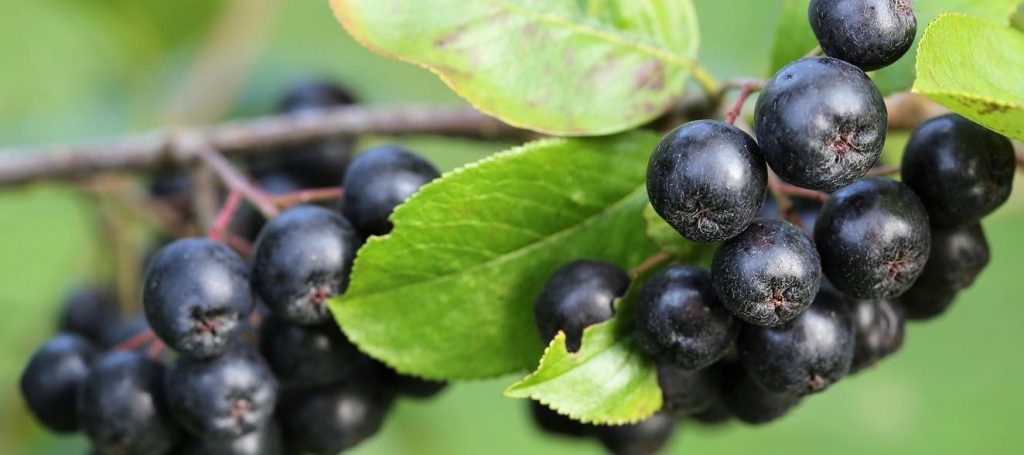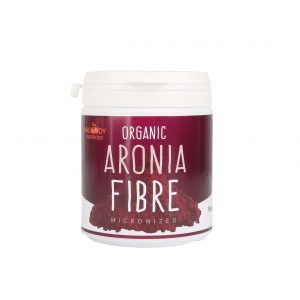Aronia (Chokeberry)
Aronia (chokeberry) is a wild shrub native to North America. It appeared in Europe in the second half of the 20th century. In recent years, it has been gaining popularity thanks to the scientific research that appears every year, confirming its numerous health-promoting properties.
The unique quality of aronia (chokeberry) lies in its very high antioxidant activity, in which it surpasses all other fruits. Aronia has very high concentrations of valuable phytonutrients, mainly flavonoids and polyphenols. It combines in itself the advantages of red wine and green tea.
100 grams of fruit contain over 2500 mg of polyphenols, which is many times more than the body’s daily antioxidant requirements. In addition to polyphenols, aronia is rich in B vitamins, vitamin C, potassium, molybdenum and manganese.
A great advantage of aronia is also the fact that its fruits do not accumulate heavy metals. Even in case of plantations situated by busy roads, the fruit is found to contain less harmful substances than the EU standards.
Moreover, both shrubs and aronia fruits are resistant to pests and diseases, so there is no need to apply pesticides.
Aronia benefits
Chokeberry is considered to be one of the healthiest fruits on Earth. So far, hundreds of scientific studies have been carried out on the chemical compounds found in chokeberry fruits.
Aronia has proven to be particularly effective:
- In the prevention of atherosclerosis
As we know, heart and cardiovascular diseases are the main causes of premature death. Improving the diet by including products rich in antioxidants slows down the development of atherosclerotic processes. Aronia lowers blood pressure and should therefore be a permanent component of the diet of people at risk of heart attack and stroke. - With liver problems
In 2016, Japanese scientists tested the effect of aronia juice on rats with damaged liver. After 28 days of the standard diet with chokeberry juice, a decrease in the severity of liver damage symptoms was observed.
Similar properties of aronia were also observed a year later by scientists from the University of Belgrade. - In hypertension
The results of clinical trials involving hypertensive patients at risk of myocardial infarction are very promising. After two months of treatment with aronia extract, a significant reduction in blood pressure was shown, in comparison to baseline values (systolic blood pressure decreased from 144 to 132 mmHg, diastolic from 87 to 82 mmHg). In the same study a positive effect on cholesterol levels was observed.
Conclusion – thanks to the beneficial effect on blood pressure and cholesterol levels, black aronia products may be helpful in the treatment of patients with metabolic syndrome. - In the prevention of neurodegenerative diseases
The impairment of brain function progresses with age, but also due to degenerative diseases (Alzheimer’s, Parkinson) or abuse of agents toxic to the central nervous system such as alcohol, some drugs and psychoactive agents. These changes can be slowed down by administering polyphenolic compounds. Aronia extracts have been shown to be effective in restoring efficient memory and improving learning processes. - In the treatment of diabetes
Aronia anthocyanins can be used to treat type I diabetes. By administering chokeberry anthocyanins to animals it has been noticed that the course of experimentally induced diabetes has been alleviated. There was a normalization of animal body weight, decreased thirst and urine excretion, and beneficial changes in the examined indicators of diabetes – normalization of blood and urine sugar levels and inhibition of free radicals generation.
Another study included 105 pregnant women with diabetes, 50 of them were treated with anthocyanins from aronia, the rest were given placebo. It was found that under the influence of chokeberry anthocyanins the level of oLAB decreases, which indicates a lower risk of oxidative stress. - In protection against UV radiation
This is especially true for people going on holiday to sunny beaches without getting their skin gradually accustomed to sunlight. Flavonoid creams can protect the skin from photo-oxidative stress. Studies show that drinking aronia juice before going on holiday allows you to stay in the sun longer and avoid sunburn in the first days. Taking supplements with catechins, which aronia is an excellent source, doubled the dose of radiation necessary for skin redness. - In the protection of eyesight
Oxidative stress initiates and accelerates the formation of cataract and pathological changes in the macula. A diet rich in antioxidants can slow down these processes. It also has an impact on ensuring good night vision and visual acuity (anthocyanins improve microcirculation and reduce the fragility of capillaries). In the past, this problem mainly concerned pilots and professional drivers. Nowadays, eye fatigue caused by long staring at a monitor has become a social problem. Because polyphenols have a beneficial effect on the eyesight of people working on a computer or sitting in front of a TV for a long time, aronia can be recommended to practically everyone. - In the treatment of rheumatoid arthritis
Anti-inflammatory drugs (ibuprofen, naproxen, indomethacin) which act as cyclooxidase inhibitors (COX-1 and COX-2) are used in the treatment of rheumatoid arthritis. These enzymes participate in the synthesis of compounds responsible for inflammation and pain. Studies show that cyanidine and anthocyanin extract from aronia inhibit the activity of these enzymes to a degree comparable to that of drugs such as ibuprofen or naproxen.
Consumption of fruit rich in anthocyanins, including chokeberry, is beneficial for health and should be recommended for people suffering from rheumatism and joint pain. - In the treatment of stomach ulcers
The study showed a beneficial effect of anthocyanins obtained from aronia on gastric ulcers.
Simultaneous administration of acidified ethanol and an appropriate dose of anthocyanins significantly inhibited the formation of gastric ulceration in the gastric mucosa in experimental animals. It also inhibited the processes of lipid oxidation of cell membranes in the intestine, liver and lungs. The observed effects suggest a positive, protective effect of anthocyanins both directly on the gastric mucosa and supporting the elimination of damage caused to other organs. - In prevention of allergic diseases
- In the prevention of bacterial and virus infections
Contraindications
Chokeberry in any form is beneficial to health. There are no contraindications to eating chokeberry, even when using medicines of natural or synthetic origin. So far no interaction of chokeberry has been described, and no allergy to chokeberry has been found. So it is worth to include chokeberry products in everyday menu, because, as we know, it is cheaper and better to prevent than to treat.
Beneficial compounds present in aronia
Polyphenols
These are organic compounds with a strong antioxidant effect. Polyphenols have many proven health benefits. They help with problems with digestion, weight control, diabetes, cardiovascular diseases and neurodegenerative diseases. Polyphenols are common in most vegetables and fruits, however, their concentration in aronia fruits is higher than in any other fruit.
| Owoc: | Aronia | Czarna Porzeczka | Czerwona Porzeczka | Jagody | Wiśnie | Truskawki | Jabłka |
| Zawartość polifenoli w 100g: | 2556mg | 560mg | 210mg | 521mg | 460mg | 225 | 250 |
Anthocyanins
These are natural dyes found in dark (maroon, navy blue and violet) fruits and vegetables. Their health-enhancing properties, have been confirmed by scientific research. Anthocyanins present in fruit and aronia products are very strong antioxidants, limiting the negative impact of free radicals on the body. Moreover, they have a positive effect on the entire circulatory system, reduce the risk of liver disease, strengthen the body’s immunity and prevent diabetes. Thanks to dilatation of blood vessels, they also reduce the risk of infarctions, strokes and headaches. Similarly to polyphenols, aronia contains the highest amount of anthocyanins of all fruits.
Owoc: Aronia Jagody Czarna porzeczka Czerwona porzeczka Wiśnie Truskawki Winogrona Zawartość Antocyjanin w 100g: 805mg 160mg 140mg 29mg 65mg 45mg 110mg
Chlorogenic acid
It has antioxidant properties and forms complexes with metal ions. Studies show that it has anti-inflammatory and anticancer properties. Due to its antioxidant properties, chlorogenic acid contained in chokeberry fruits can make a significant contribution to the prevention of cardiovascular diseases. Its presence in the diet may also be beneficial for diabetics, as it increases glucose tolerance.
Amigdalina
It is a substance found in the seeds of apricot, cherry, peach, aronia and almond tree, which gives them a characteristic bitter taste. Many people claim that its deficiency contributes to an increase in the incidence of cancer, but its effectiveness has so far only been proven in vitro tests. Amigdalin content in fresh chokeberry fruit is 201mg/kg
Fibre
The fibre contained in aronia has four basic benefits:
- It slows down the rate of sugar absorption, which prevents blood glucose levels from rising too quickly.
- Accelerates the intestinal passage
- Works like a brush, cleaning the colon
- It allows to maintain regular bowel movements, reducing constipation
Vitamins
- Vitamin A: 25mg mg/kg
- Vitamin C: 137-270 mg/kg
- Folians: 200 μg/kg
- Vitamin B1: 180 μg/kg
- Vitamin B2: 200 μg/kg
- Vitamin B3: 3000 μg/kg
- Vitamin B5: 2,790 μg/kg
- Witamin B6: 280 μg/kg
- Vitamin E: 17,1 mg/kg
- Vitamin K: 242 μg/kg
Minerals
- Potassium: 2,180 mg/kg
- Calcium: 322 mg/kg
- Magnesium: 162 mg/kg
- Molybdenum: 11,8 mg/kg
- Iron: 9,3 mg/kg
- Manganese: 6,24 mg/kg
- Zinc: 1,47 mg/kg
- Copper: 0,91 mg/kg
- Boron: 0,71 mg/kg
Amino acids
- Treonine: 3250 mg/kg
- Proline: 1149 mg/kg
- Arginine: 327 mg/kg
- Aspartic acid: 247 mg/kg
- Histidine: 32mg/kg
- Tyrosine: 20mg/kg


 In 2016, Japanese scientists tested the effect of aronia juice on rats with damaged liver. After 28 days of the standard diet with chokeberry juice, a decrease in the severity of liver damage symptoms was observed.
In 2016, Japanese scientists tested the effect of aronia juice on rats with damaged liver. After 28 days of the standard diet with chokeberry juice, a decrease in the severity of liver damage symptoms was observed.












